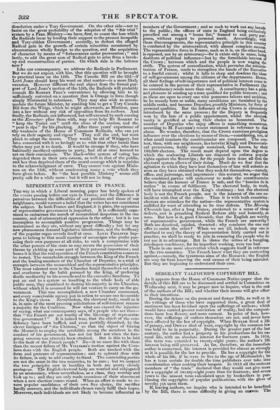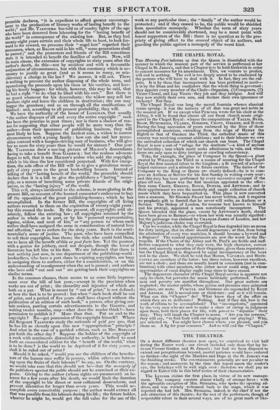SERGEANT TALFOURD'S COPYRIGHT BILL.
As it appears from the House of Commons Notice-paper that the details of this Bill are to be discussed and settled in Committee on Wednesday next, it may be proper now to inquire, what is the end of the authors of the Bill; and whether their means will give effect to their intentions.
During the debate on the present and former Bills, as well as in the writings of those who have supported them, a great deal of sentiment has been lavished upon the sufferings of authors ; which would have carried greater conviction of reality, had the composi- tions been less flowery and more earnest. In point of fact, how- ever, the sufferings of authors themselves are not, and never have been affected by the law of copyright. When BUTLER lived a life of penury, and OTWAY died of want, copyright by the common law was held to be in perpetuity. During the greater part of the last century, the author had a property in his productions for his Da. tural life, with an absolute interest for fourteen years. In 1814, this term was extended to twenty-eight years ; the author's life interest being still preserved. As far, therefore, as the immediate author is concerned, his interest is provided for almost as strongly as it is possible for the law to provide. He has a copyright for the whole of his life, if he were to live to the age of Methuselah ; he has a term certain for double the time publishers ever take into consideration when making their bargain. In 1813 all the eminent members of "time trade" declared that they would not give more for a copyright of twenty-eight years than for fourteen ; and seven years is the utmost term calculated upon by booksellers in pur- chasing the copyrights of popular publications, with the gloss of novelty yet upon them. If, leaving authors, we inquire who is intended to be benefited by the Bill, there is some difficulty in giving an answer. The
preamble declares, " it is expedient to afford greater encourage- ment to the production of' literary works of lasting benefit to the
world;" and Mr. TALFOURD has told us of sundry lights of the age who have been deterred from labouring for the "lasting benefit of the world" in consequence of the existing law. But, as they had
twenty-eight years certain and their whole life to boot, to look for-
ward to for reward, we presume their "angel ken" regarded their successors, when, as BACON said in his will, "some generations shall
be passed;" and the promoters and friends of the Bill sometimes state it is intended to benefit the families of authors. Now, will its main clause, the extension of copyrights to sixty years after the
author's death, do this—not by accident and with a favourable conjunction of circumstances, but with that constancy which is ne- cessary to justify so great (and as it seems to many, so mis- chievous) a change in the law ? We answer, it will not. There is nothing to prevent the author disposing of the whole term' and squandering the proceeds upon his vices or his vanities, and leav-
ing his timuly beggars : for which, however, this may be said, that he had a right "to do what he liked with his own." But there is no guard whatever for his descendants : the widow may sell her absolute right and leave the children in destitution ; the son may beggar the grandson; and so on through all the ramifications of kindred : and, according to all present probability, they will.
We have the authority of the house of LONGMAN, that usually "the author disposes of all and every the entire copyright :" such
has been the practice in past times ; nor is there a shadow of rea- son for supposing that other people will be more wary than the author—from their ignorance of publishing business, they will most likely be less. Suppose the hardest case, a widow in narrow circumstances with a young family : how can she and her neces- sities contend with a bargain-driving man of business, who will give her no more for sixty years than be would for sixteen ? One year
Mr. TALrounn drew a moving picture of Mn.,Tox's descendants having to take a benefit from GARRICK : but the zealous advocate forgot to tell, that it was MILTON'S widow who sold the copyright, which in his time the law considered perpetual. With few excep- tions, the sole effect of the Bill will be to give a gratuitous mono- poly of sixty years to the great bookselling houses. Instead of talking of the "lasting benefit of the world," the preamble should declare that it is a bill to give the publishers a " lasting " mono- poly, as a means of benefiting some private friends of the origi- nators, to the "lasting injury" of the world. This evil, always incidental to the scheme, is more glaring in the present Bill, on account of the learned concoctor's endeavour to buy off the opposition of the great publishing-houses ; which be has accomplished. In the former Bill, the copyrights of all living authors reverted to them on the expiration of twenty-eight years : but this roused the trade. By the present, all copyrights sold ab- solutely, follow the existing law ; all copyrights retained by the author in whole or in part, or by his "personal representative, legatee, widow, and next of kin,' or "any person to whom such author shall have assigned the same in consideration of natural love and affection," are to endure for the sixty years. Such is the senti- mentalist's sense of justice. The poor, who have been compelled to sell their copyrights, lose them; the rich, who could hold them, are to have all the benefit of this ex post facto law. Yet the poorest, with a genius for jobbery, need not despair, though the lover of literature has left him to his fine. 'We are informed that there is vast activity just now, in one department of the publishing-world : booksellers, who have a part share in expiring copyrights, arc busy in assigning them to authors, either for a consideration, or on the understanding of reassignment when the act is passed ; and authors who have sold "out and out" are getting back their copyrights on similar terms.
In the common clauses, there seems to us some little improve- ment over the bill of last year,—except in the provision when works are out of punt; the absurdity and injustice of which are both on a par. What is meant by "out of print," is not defined; or how the fact is to be proved: but when "such book shall be out of print, and a period of five years shall have elapsed without the publication of an edition of such book," a person, after giving cer- tain notices, putting certain advertisements in the Gazette, and waiting twelve months, may—what does the reader think ?—have permission to publish it ? More than that. Put an end to the copyright ? No—get possession of the copyright himself! Where did Sergeant TALFOURD study the rationale of quid pro quo, that he has hit so cleverly upon this new " appropriation" principle ? And what in the case of a garbled edition, such as Mrs. SHELLEY put forth the other day ? Suppose the holder of the copyright of a work with sentiments distasteful to authority, is bribed to send forth an emasculated edition for the " benefit of the world," what is to be done ? is the world to be deprived of it for sixty years, or shall it be ruled out of print? Should it be asked, " would you sec the children of the benefac- tors of the human race suffer in penury, whilst others are batten- ing upon the fruits of their labours ?" we say, no. On the contrary, we would take care that this should not be—that the monopoly of the publishers against the public should not be exercised at their ex- pense. Giving to the author (whose rights are paramount) an in- terest for a few years after his death, we would limit the duration of the copyright to his direct or near collateral descendants and prevent alienation for longer than seven years. This would ac- complish every conceivable purpose: the author would extract all that was possible from his labours during his life ; the future holder, 'whoever he might be, would get the full value for the use of the
work at any particular time; the " family " of the author would be protected ; and if they ceased to be, the public would be shielded from speculative monopoly. Whether the term of sixty years should not be considerably shortened, may be a moot point with honest supporters of the Bill : there is no question as to the pro- priety of giving effect to the avowed object of its authors, and guarding the public against a monopoly of the worst kind.























 Previous page
Previous page